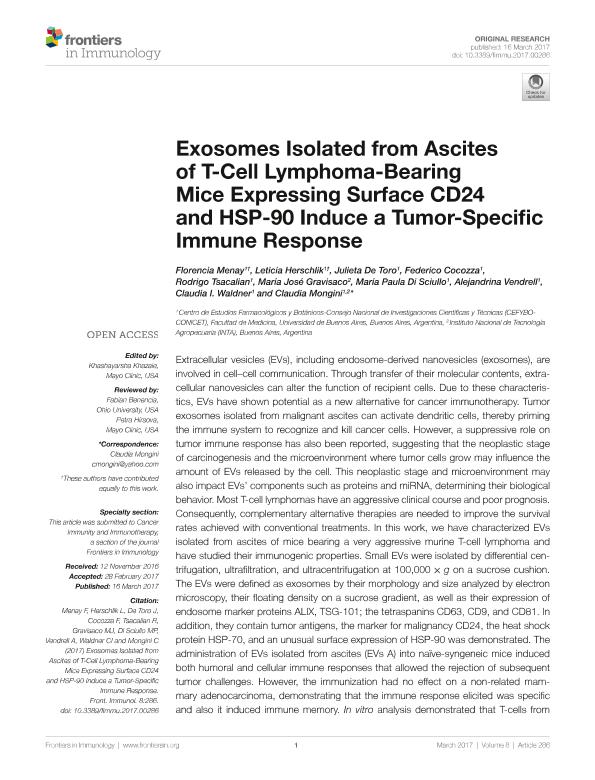Artículo
Exosomes Isolated from Ascites of T-Cell Lymphoma-Bearing Mice Expressing Surface CD24 and HSP-90 Induce a Tumor-Specific Immune Response
Menay, Florencia ; Hershlik, Leticia; de Toro, Julieta; Cocozza, Federico
; Hershlik, Leticia; de Toro, Julieta; Cocozza, Federico ; Tsacalian, Rodrigo Farid; Gravisaco, María José; Di Sciullo, Maria Paula
; Tsacalian, Rodrigo Farid; Gravisaco, María José; Di Sciullo, Maria Paula ; Vendrell, Alejandrina
; Vendrell, Alejandrina ; Waldner, Claudia Ines
; Waldner, Claudia Ines ; Mongini, Claudia
; Mongini, Claudia
 ; Hershlik, Leticia; de Toro, Julieta; Cocozza, Federico
; Hershlik, Leticia; de Toro, Julieta; Cocozza, Federico ; Tsacalian, Rodrigo Farid; Gravisaco, María José; Di Sciullo, Maria Paula
; Tsacalian, Rodrigo Farid; Gravisaco, María José; Di Sciullo, Maria Paula ; Vendrell, Alejandrina
; Vendrell, Alejandrina ; Waldner, Claudia Ines
; Waldner, Claudia Ines ; Mongini, Claudia
; Mongini, Claudia
Fecha de publicación:
03/2017
Editorial:
Frontiers Research Foundation
Revista:
Frontiers in Immunology
ISSN:
1664-3224
Idioma:
Inglés
Tipo de recurso:
Artículo publicado
Clasificación temática:
Resumen
Extracellular vesicles (EVs), including endosome-derived nanovesicles (exosomes), are involved in cell–cell communication. Through transfer of their molecular contents, extracellular nanovesicles can alter the function of recipient cells. Due to these characteristics, EVs have shown potential as a new alternative for cancer immunotherapy. Tumor exosomes isolated from malignant ascites can activate dendritic cells, thereby priming the immune system to recognize and kill cancer cells. However, a suppressive role on tumor immune response has also been reported, suggesting that the neoplastic stage of carcinogenesis and the microenvironment where tumor cells grow may influence the amount of EVs released by the cell. This neoplastic stage and microenvironment may also impact EVs’ components such as proteins and miRNA, determining their biological behavior. Most T-cell lymphomas have an aggressive clinical course and poor prognosis. Consequently, complementary alternative therapies are needed to improve the survival rates achieved with conventional treatments. In this work, we have characterized EVs isolated from ascites of mice bearing a very aggressive murine T-cell lymphoma and have studied their immunogenic properties. Small EVs were isolated by differential centrifugation, ultrafiltration, and ultracentrifugation at 100,000 × g on a sucrose cushion. The EVs were defined as exosomes by their morphology and size analyzed by electron microscopy, their floating density on a sucrose gradient, as well as their expression of endosome marker proteins ALIX, TSG-101; the tetraspanins CD63, CD9, and CD81. In addition, they contain tumor antigens, the marker for malignancy CD24, the heat shock protein HSP-70, and an unusual surface expression of HSP-90 was demonstrated. The administration of EVs isolated from ascites (EVs A) into naïve-syngeneic mice induced both humoral and cellular immune responses that allowed the rejection of subsequent tumor challenges. However, the immunization had no effect on a non-related mammary adenocarcinoma, demonstrating that the immune response elicited was specific and also it induced immune memory. In vitro analysis demonstrated that T-cells from EVs A-immunized mice secrete IFN-γ in response to tumor stimulation. Furthermore, tumor-specific CD4+ and CD8+ IFN-γ secreting cells could be efficiently expanded from mice immunized with EVs A, showing that a T helper 1 response is involved in tumor rejection. Our findings confirm exosomes as promising defined acellular tumor antigens for the development of an antitumor vaccine.
Palabras clave:
Ascites
,
Exosomes
,
Immune Response
,
T-Cell Lymphoma
,
Tumor Vaccine
Archivos asociados
Licencia
Identificadores
Colecciones
Articulos(SEDE CENTRAL)
Articulos de SEDE CENTRAL
Articulos de SEDE CENTRAL
Citación
Menay, Florencia; Hershlik, Leticia; de Toro, Julieta; Cocozza, Federico; Tsacalian, Rodrigo Farid; et al.; Exosomes Isolated from Ascites of T-Cell Lymphoma-Bearing Mice Expressing Surface CD24 and HSP-90 Induce a Tumor-Specific Immune Response; Frontiers Research Foundation; Frontiers in Immunology; 8; 3-2017; 266-280
Compartir
Altmétricas



